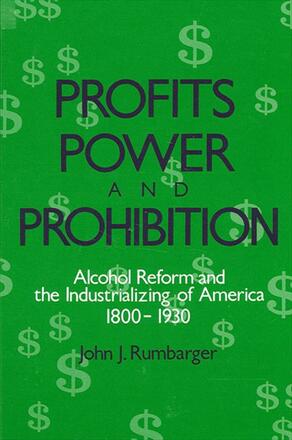
Profits, Power, and Prohibition
American Alcohol Reform and the Industrializing of America, 1800-1930
Alternative formats available from:
Description
This is the first comprehensive study of America's anti-liquor/anti-drug movement from its origins in the late eighteenth century through the repeal of the Eighteenth Amendment in 1933. It examines the role that capitalism played in defining and shaping this reform movement.
Rumbarger challenges conventional explanations of the history of this movement and offers compelling counter-arguments to explain the movement's historical development. He successfully links the ethics of business enterprise and those of moral reform of society for the betterment of enterprise.
The author reveals how readily economic power is transformed—first into social power and finally into political power in the context of a bourgeois democracy. He shows that the motivation driving this reform movement was not religiosity, but profit, and that anti-liquor capitalists viewed the "human equation" as determinant of America's prospect for creating wealth.
John J. Rumbarger, former assistant executive secretary of the American Historical Association and editor of Prologue: Journal of the National Archives, lives and works in Washington, D. C.
Reviews
John Rumbarger's Profits, Power, and Prohibition is not only the definitive book on the origins of Prohibition in the United States but it is also a remarkably vivid dissection of the subtle interaction between politics, business interest, and social thought throughout the formative years of America's industrialization. No other writer has offered as many completely original insights into the causes of Prohibition or its secular significance as Rumbarger. It is required reading for anyone interested in the sources of liquor reform as well as the role of businessmen in the passage of legislation with, by far, the greatest consequences of all of the many post-civil War reform measures to daily mores and society. for all those interested in politics, social mores, and power in modern American history, Profits, Power, and Prohibition will alter profoundly their traditional understanding of liquor control and its real significance. " — Gabriel Kolko, Distinguished Professor of History, University of York
"About half a century ago, I thought of the Prohibition movement as chiefly an agrarian protest against the urban saloon and its use by immigrants and other urban workers. Dr. Rumbarger has convincingly shown how much the movement, even from its origins, depended on the effort of employers to maintain an efficient labor force. " — Thomas C. Cochran, Benjamin Franklin Professor of History, University of Pennsylvania